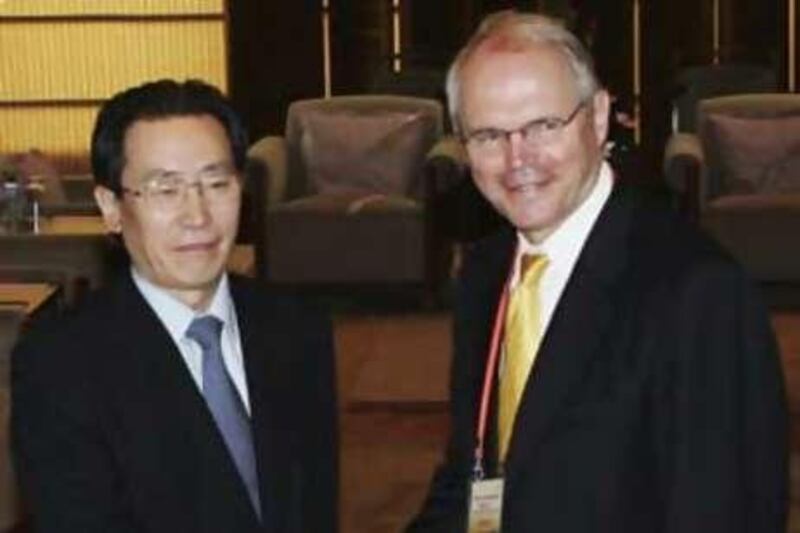Talks on North Korea's nuclear programmes are set to resume after a nine-month break, with the United States describing the latest round as pivotal in the long-running disarmament process. Envoys from the six nations involved in the talks were due to gather in Beijing from 4.00pm local time (11.00am UAE time) to capitalise on recent progress that saw the North finally give a declaration of its nuclear activities last month.
The US responded to the North's declaration by easing some trade sanctions and beginning the process of taking the North off of its list of state sponsors of terrorism. The developments have fuelled cautious optimism of further progress in the often tortuous talks, which began in 2003 and involve China as host, the two Koreas, the US, Japan and Russia. US officials have said one of the main points of focus will be working out how to verify the declaration, while the North has signalled it wants to be fully rewarded for its latest steps towards dismantlement.
"We are at a very pivotal point in the six party process," the US National Security Council director for Asia Dennis Wilder said on Saturday as he outlined US priorities for this week's talks. North Korea made its declaration as part of a landmark disarmament accord agreed in the six-party forum in February 2007. The declaration was a key part of the so-called "second phase" of the agreement, with the first phase seeing North Korea shut down its main plutonium-producing reactor at Yongbyon in July.
It then began disabling the plant under the supervision of US inspectors in November, and last month blew up the cooling tower at Yongbyon in a gesture intended to demonstrate its commitment to disarmament. The Yongbyon plant was the source of the material the North used to conduct its first atomic test in 2006, an event that saw the US soften its hardline stance against Pyongyang and begin offering incentives for disarmament.
The North's declaration covered its nuclear facilities and the production of the plutonium, but not weapons or a suspected programme involving highly enriched uranium that can also be used to make bombs. The third and final phase of the disarmament deal calls for the North to permanently dismantle its atomic plants and hand over all nuclear material and weaponry. In return, it would receive wide ranging energy aid benefits, as well as a restoration of diplomatic ties with the US and Japan.
However, the US envoy to the talks warned the next stage in the process ? verifying the North's declaration ? may take months. "Verification itself will take longer than just a few days, verification will take several weeks or even months. But we need to agree on how verification will work," Christopher Hill, the US assistant Secretary of State and chief nuclear envoy, said in Beijing yesterday. Meanwhile, the North has complained the other parties involved in the talks have not fulfilled their ends of the bargain, particularly the delivery of one million tonnes of fuel it was meant to receive during the second phase.
"We stick to the principled basic position that the principle of action for action must be respected," a North Korean foreign ministry spokesman said last week. He complained that while 80 per cent of the Yongbyon facility had been disabled, only 40 per cent of the promised energy aid had been delivered. The spokesman also complained that Washington's decision to drop the North from a terrorism blacklist, as agreed in last year's accord, had not yet taken effect "due to procedural reasons."
After the declaration was handed over, the US President George W Bush notified Congress of his plan to drop the North from a list of state sponsors of terrorism. But the move cannot take effect until a 45-day review period has passed. *AFP





